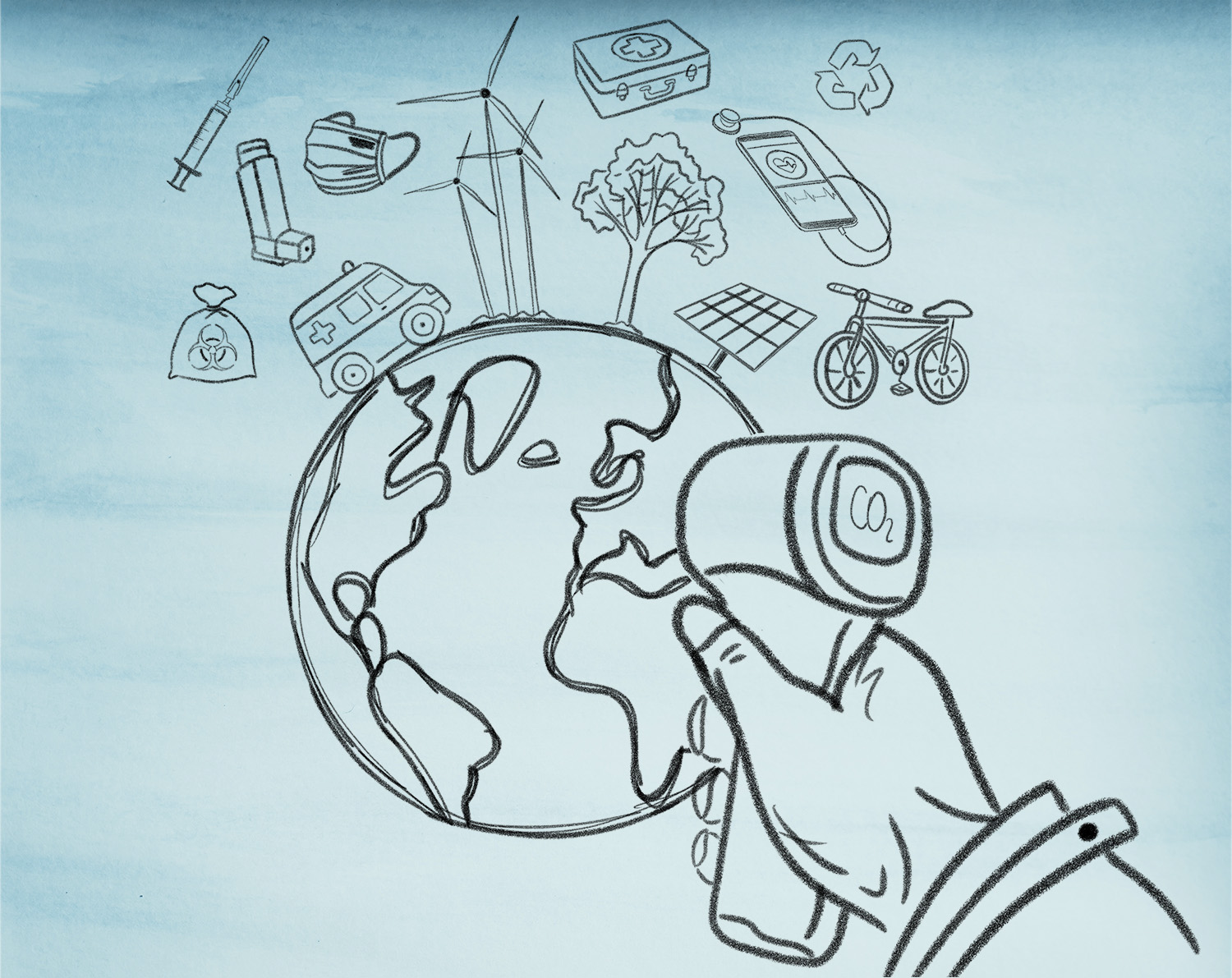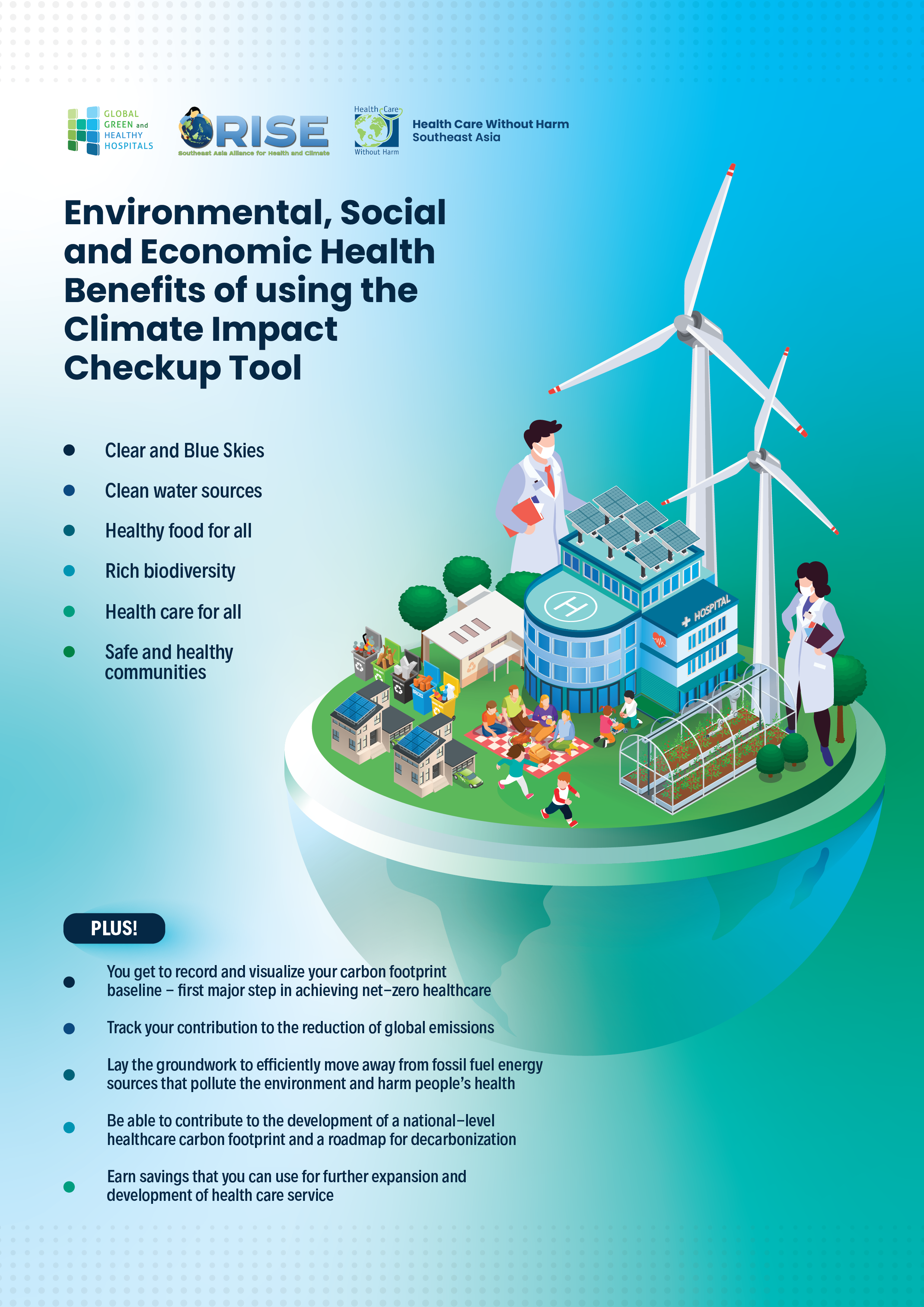KEY LESSONS FROM SOUTH-EAST ASIA: Pilot Training of Trainers on the Climate Impact Checkup Tool
According to the Healthcare Carbon Footprint Report published by Health Care Without Harm (HCWH) and Arup in 2019, the healthcare sector’s climate footprint is 4.4% of global net emissions, and if the sector were a country, it would be the fifth-largest carbon emitter worldwide. Without collaborative, drastic, and urgent strategies in motion towards adaptation and carbon-reduction, South-East Asian cities and communities will experience more disastrous flooding, life-threatening rise in sea level, deadly heat waves and humidity, including severe tropical cyclones and extreme drought among others.
In this light, a crucial opportunity for health and climate action advocates is at hand – to invest in strengthening and extending solutions to ensure access to healthcare, reclaim the planet’s future and save lives.
HCWH therefore launched the Climate Impact Checkup Tool in 2021 that allows health facilities to calculate and track their carbon footprint using data primarily from energy consumption, transport, waste management, and greenhouse gases relevant to the sector. Understanding major emission sources will allow an institution or a health ministry to target their mitigation efforts, develop carbon reduction roadmaps, and uphold healthcare climate action leadership.
Towards the end of May 2022, HCWH in Southeast Asia organized the first ever Climate Impact Checkup Tool Training of Trainers in an aim to build the capacity of the Global Green and Healthy Hospital (GGHH) members and select ministries of health in the region, including those who have committed to the COP26 Health Programme, to establish their baseline carbon emissions, set target reductions and develop action plans for mitigation.
Prior to the training, the delegates visited St. Paul’s Hospital in Iloilo, Philippines and toured the facility’s low-carbon and sustainable initiatives and provided tangible examples on how the hospital maximized the results of the tool in their sustainability journey.
It was attended by GGHH members and representative of ministries of health from Indonesia, Malaysia, Philippines, and Lao. And the preparatory trainers were composed of HCWH staff from the Southeast Asia office and Antonella Risso, HCWH International Climate Technical and Research Manager.
The training materials and topics included an overview of how climate change impacts health, an introduction to the Tool, followed by a discussion on why and how the healthcare sector must take the path towards mitigation. Plenary and individual exercises were also conducted on how to develop a carbon management or action plan, while delegates learn about the types of greenhouse gases relevant to the healthcare sector during the discussion on the basics of carbon footprint and GHG inventories. The 2-day session was capped with the topic on how to understand one’s baseline data and how it can be communicated in various ways for advocacy and leadership by example.
KEY HIGHLIGHTS:
Delegates were able to gain knowledge on the issues of climate change, the need to reduce carbon footprint, start a sustainability journey and involve other people especially work colleagues in the campaign;
Delegates increased their capacity in determining sources of healthcare emission and where to get the data. They were able to navigate the Tool and understand how to establish their baseline carbon emissions, set target reductions and develop action plans for mitigation, but follow through activities are still necessary to support them in using their learnings into actual implementation.
GGHH members showed willingness and enthusiasm to be trainers for their country-based training. Although assistance from the SEA trainers will still be needed in terms of technical terminologies, concepts, and effective facilitation.
The ministry of health representatives pledged to participate and support the country-based trainings to reach more health institutions.
New relationships among ministries of health in Indonesia, Lao and Malaysia were also established.
Delegates widened their network of people from other facilities to learn about their sustainable practices and through this pilot training, they were able to contribute to the global healthcare climate action momentum.
Health Care Without Harm’s Southeast Asia initiatives, tools and resources have also been promoted
It is important to note that aside from the pre-developed presentations, support learning materials were also produced and utilized by the delegates to make discussions visually easier to follow:
- Bite-size Climate Impact Checkup Tool Infographics
- Bahasa Indonesia translation of the Climate Impact Check-up tool manuals (more translations are coming)
Last but not the least, the training embodied diversity and balance. From the varying backgrounds and capacities of the delegates – wherein some are already leading and with experience in sustainable procurement, energy efficiency, waste management, and others even chemical substitution provide convincing that an ambitious decarbonization plan is possible and must be done. And in terms of experience – it wasn’t all technical but also comprehensive, creative, and participative through the addition of communications for healthcare transformation in the program design. ###
A complete key learnings document will soon be available here: https://healthcareclimateaction.org/checkup
